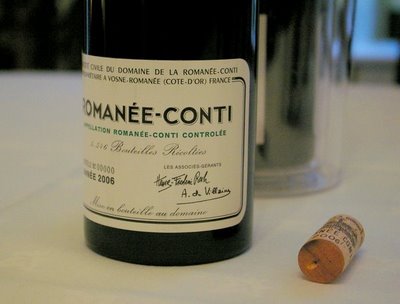Tasting great wines blind
 I've recently had the chance to taste some rather grand French wines blind, without realizing what I was tasting. There were some smart wines in the London installment of the Berlin tasting - Lafite, Latour and Margaux 2005. And then in the Pinot Noir session at the Landmark Australia Tutorial, Tom Carson slipped in a bottle of DRC Romanee St Vivant 2002 as a ringer.
I've recently had the chance to taste some rather grand French wines blind, without realizing what I was tasting. There were some smart wines in the London installment of the Berlin tasting - Lafite, Latour and Margaux 2005. And then in the Pinot Noir session at the Landmark Australia Tutorial, Tom Carson slipped in a bottle of DRC Romanee St Vivant 2002 as a ringer.Some observations? Well, the DRC wasn't very good, or at least not as good as it should have been. It was in the middle of a flight of older Australian Pinot Noirs, and while I scored it at 90/100, I didn't think for one moment that it was of DRC quality, or even that it was particularly Burgundian when compared with the other wines in the flight.
The Lafite was too oaky - almost to the point of faultiness - although I noted that there was a serious wine here waiting to emerge. The Margaux I liked, but I thought it was a little rustic and bretty. The Latour wasn't totally clean, but this could have been a cork issue. Had I seen the label of any of these wines, I'd have felt some pressure to look harder for their merits. Indeed, when the identity of the DRC was revealed everyone started to make excuses for it in a way they wouldn't have done with the Australian wines (it's closed; it's going through an awkward phase).
Reputation matters a great deal in the world of wine. Our senses of taste and smell are, it seems, easily fooled. We bring a lot of expectation to these grand bottles of wine. In a mischievous experiment, a French researcher called Frederic Brochet (see here) served the same average-quality wine to experienced tasters at a week’s interval.
The twist was that on the first occasion it was packaged and served to people as a Vin de Table, and on the second as a Grand Cru wine. So the subjects thought they were tasting a simple wine and then a very special wine, even though it was the same both times.
We’d probably all like to think we’d not have been taken in by this ruse, but Brochet’s tasters fell for it. He analysed the terms used in the tasting notes, and it makes telling reading. For the ‘Grand Cru’ wine versus the Vin de Table, ‘A lot’ replaces ‘a little’; ‘complex’ replaces ‘simple’; and ‘balanced’ replaces ‘unbalanced’ – all because of the sight of the label.
Brochet explains the results through a phenomenon called ‘perceptive expectation’: a subject perceives what they have pre-perceived, and then they find it difficult to back away from that. For us humans, vision is our dominant sense and so we trust it over our senses of smell and taste. Brochet uses these results to explain Peynaud’s observation that ‘Blind tasting of great wines is often disappointing’.
Labels: blind tasting, perception. psychology
 The web log of wine journalist Jamie Goode. Feel free to nose around; your comments are welcome
The web log of wine journalist Jamie Goode. Feel free to nose around; your comments are welcome 
